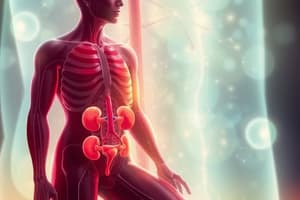Podcast
Questions and Answers
What is the primary function of excretion in an organism?
What is the primary function of excretion in an organism?
to remove waste products from the body
What are the three main types of excretion in the human body?
What are the three main types of excretion in the human body?
urinary, fecal, and sweat excretion
Which organs are involved in urinary excretion?
Which organs are involved in urinary excretion?
kidneys
What is the role of the liver in excretion?
What is the role of the liver in excretion?
What is the mechanism of excretion that requires energy?
What is the mechanism of excretion that requires energy?
What is the process that helps to regulate water balance and ion levels in the body?
What is the process that helps to regulate water balance and ion levels in the body?
How does the skin aid in excretion?
How does the skin aid in excretion?
What is the role of the lungs in excretion?
What is the role of the lungs in excretion?
Flashcards are hidden until you start studying
Study Notes
Overview of Excretion
Excretion is the process by which an organism removes waste products from its body. These waste products can be in the form of chemicals, ions, or other substances that are not needed or are harmful to the organism.
Importance of Excretion
- Removes toxic substances from the body
- Maintains homeostasis by regulating ion balance and pH levels
- Helps to conserve water and electrolytes
- Plays a crucial role in maintaining healthy blood pressure
Types of Excretion
- Urinary Excretion: removal of waste products through the kidneys and excreted in the urine
- Fecal Excretion: removal of waste products through the liver and excreted in the feces
- Sweat Excretion: removal of excess heat and small amounts of waste products through sweat glands
- Respiratory Excretion: removal of carbon dioxide and other gases through the lungs
Organs Involved in Excretion
- Kidneys: filter waste products from the blood and regulate electrolyte levels
- Liver: detoxifies the blood and removes waste products
- Skin: aids in the removal of waste products through sweat
- Lungs: remove carbon dioxide and other gases from the body
- Intestines: absorb nutrients and remove waste products
Mechanisms of Excretion
- Active Transport: energy-dependent process that moves molecules from an area of low concentration to an area of high concentration
- Passive Transport: energy-independent process that moves molecules from an area of high concentration to an area of low concentration
- Osmoregulation: regulation of water balance and ion levels in the body
Overview of Excretion
- Excretion is the process of removing waste products from the body, which can be in the form of chemicals, ions, or other substances that are not needed or are harmful to the organism.
Importance of Excretion
- Excretion removes toxic substances from the body, regulates ion balance and pH levels to maintain homeostasis, conserves water and electrolytes, and plays a crucial role in maintaining healthy blood pressure.
Types of Excretion
- Urinary excretion removes waste products through the kidneys and excretes them in the urine.
- Fecal excretion removes waste products through the liver and excretes them in the feces.
- Sweat excretion removes excess heat and small amounts of waste products through sweat glands.
- Respiratory excretion removes carbon dioxide and other gases through the lungs.
Organs Involved in Excretion
- Kidneys filter waste products from the blood and regulate electrolyte levels.
- Liver detoxifies the blood and removes waste products.
- Skin aids in the removal of waste products through sweat.
- Lungs remove carbon dioxide and other gases from the body.
- Intestines absorb nutrients and remove waste products.
Mechanisms of Excretion
- Active transport is an energy-dependent process that moves molecules from an area of low concentration to an area of high concentration.
- Passive transport is an energy-independent process that moves molecules from an area of high concentration to an area of low concentration.
- Osmoregulation regulates water balance and ion levels in the body.
Studying That Suits You
Use AI to generate personalized quizzes and flashcards to suit your learning preferences.




